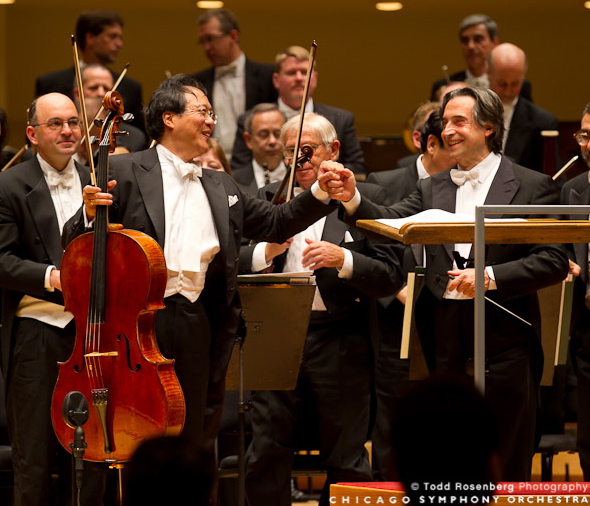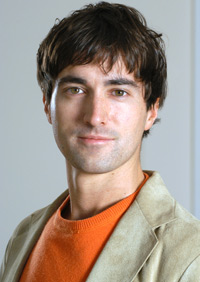A rousing premiere, Yo-Yo Ma and an Italian musical postcard (mailed from Germany) close Muti’s first season

Riccardo Muti’s final program of his inaugural season as the Chicago Symphony Orchestra’s music director could hardly have been more adroitly balanced: the local premiere of a newish work by one of the CSO’s composers in residence, a concerto collaboration with Yo-Yo Ma, and a rarely heard work by Richard Strauss inspired by Muti’s Mediterranean homeland.
The evening led off with the local premiere of Mason Bates’ The B-Sides. Like the surprising items one might discover on the flipside of an old 45, the suite of “off-kilter symphonic pieces” is meant to offer, in the composer’s words, “brief landings on a variety of peculiar planets.”
I’ve had ambivalent feelings about Bates’ music, finding his output unvaried and rather self-consciously hip, heavily reliant on amped-up percussive riffs and rhythmic club electronica while offering little else.
Yet The B-Sides is much more substantial, revealing the CSO’s 34-year-old composer in residence as something more than a one-trick electronic pony.

Some composers, like John Adams, need a large canvas for their music to make effective impact, and Bates seems cut from the same cloth. Scored for large orchestra, The B-Sides shows that, despite his reputation as a composer whose music is dominated by rhythmic pop influences, Bates is at his finest and most convincing as a symphonic colorist working with a wide palette.
The five whimsically titled movements –another trait he shares with Adams — deliver an array of bracing and imaginative textures. The mechanistic opening section, “Broom of the Future” opens with the scraping of sandpaper blocks. Amid a Minimalist pulsing, there are elliptical fragments from strings and percussion with a literally sweeping contribution from the subtitle cleaning implement. (I’ll never look at my broom the same way.) Inspired by a Hawaiian vacation, “Aerosol Melody” offers a languid, slow-jazz feel conveying the mellow relaxed quality of a tropical vacation.
The final three sections are played without pause. “Gemini in the Solar Wind” employs audio from the 1965 Gemini IV mission with majestic writing for brass and winds that conveys some of the astronauts’ sense of the awe and vastness of space.
We’re precipitously brought back to earth in “Temescal Noir” and “Warehouse Medicine.” The former was inspired by Bates’ Oakland DJ days and has an easy-going 1940s Big Band sensibility. In the driving and raucous finale, Bates’ electronica imfluence comes into full impact employing a typewriter and oil drum amid the huge percussion battery on its way to a resounding and exuberant conclusion.
Premiered by the San Francisco Symphony in 2009, The B-Sides packs a lot of music into just 20 minutes and remains Bates’ most impressive work to date. Less dependent on electronic tropes and wielding his pop influences much more skilfully, this is distinctive and imaginative music, with strikingly confident writing for large symphonic forces. Muti and the CSO delivered a knockout virtusoic performance — special kudos to the hard-working percussion section — making the best possible case for Bates’ music.
The evening’s centerpiece was Schumann’s Cello Concerto with Yo-Yo Ma as solo protagonist. The CSO’s creative consultant floated some lovely playing in the central Adagio, and his technical facility and seamless legato remain individual and distinctive.
Granted, Schumann’s concerto is a more intimate and less overtly dramatic work than most in the genre. But surely, there should be more drive and vitality than heard Thursday night, in a solo reading that was indulgent to the point of distortion.
Ma’s performance was one of those occasions when the popular musician’s interpretive characterisms draw more attention to his mannered effects than the actual work he is playing: the hairpin descrescendos, thin filagree of sound hovering on the edge of audibility and drawn-out solo passages Thursday night threatened to bring the performance to a full stop.
Muti gave the wheel to the CSO’s creative consultant in a way he likely wouldn’t do for many other colleagues, supporting with an alert accompaniment but definitely taking a back-seat to his star soloist.
Richard Strauss’s Aus Italien is his symphonic homage to Italy. Written after a vacation, this sprawling and unwieldy work shows little of the taut craft and cohesion of the masterworks to come (Don Juan would follow the next year). Most jarring is the bizarro finale with its outright crib of Luigi Denza’s Neapolitan song Funiculi-Funicula (in fairness, Strauss believed the tune to be a folk melody and not a copyrighted work).
Aus Italien is not primo Strauss, but this is music Muti clearly feels a great affection for with a special significance. Strauss’s symphonic fantasy was given its first Chicago Symphony performance by Muti when the Italian conductor made his debut with the orchestra at Ravinia in 1973.
As in his celebrated 1990 recording with the Berlin Philharmonic on Philips, the CSO’s music director brought a crackling conviction and Mediteranean warmth to Strauss’s musical postcards, almost making one believe this is a better work than it is.
Under their music director, the CSO members brought a radiant, shimmering lyricism to the pastoral opening, “In the Country,” and apt drama and majesty to the second movement’s evocation of Rome’s past glory and Roman legions. The characterful woodwinds were joined by guest clarinetist Todd Levy, principal of the Milwaukee Symphony Orchestra.
Even the most fanatical Straussian will cringe at the ramshackle final movement but given this level of blazing commitment, it proved hard to resist with Muti adding an extra bit of emphatic intensity to the three- note coda, an apt closer for his first season as music director in Chicago.
The program will be repeated 1:30 p.m. Friday and 8 p.m. Saturday. cso.org; 312-294-3000.
Posted in Performances




